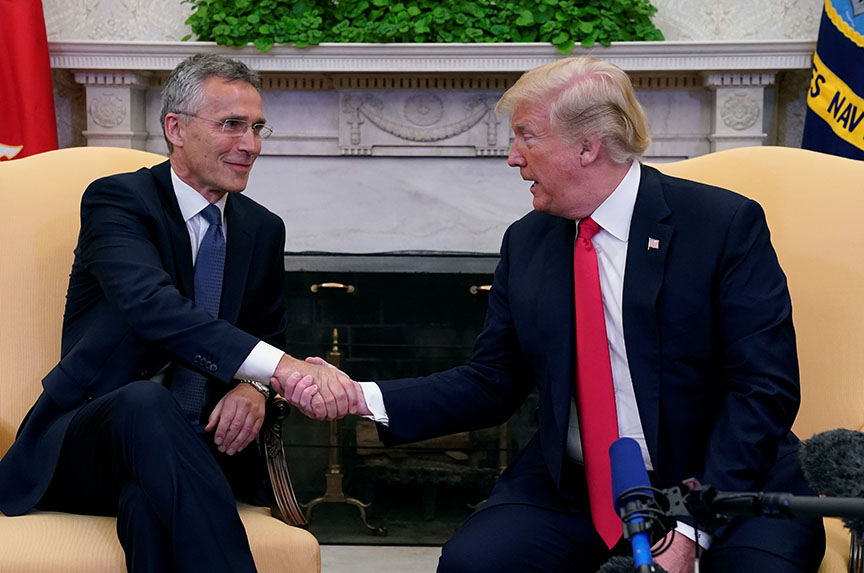 Two summits this month—NATO’s in Brussels and US President Donald J. Trump’s first one with Russian President Vladimir Putin in Helsinki—are causing much anxiety in Europe.
Two summits this month—NATO’s in Brussels and US President Donald J. Trump’s first one with Russian President Vladimir Putin in Helsinki—are causing much anxiety in Europe.
While in public, NATO and European officials are at pains to put on the best possible face, in private they have abundant and good reasons to be apprehensive about Trump’s policies, allied cohesion, and European security.
Trump has berated European leaders both privately and publicly and torpedoed the recent G-7 meeting in Canada. He has branded US allies enemies and waged a wholly unnecessary trade war against them. He has labeled NATO as being “as bad as NAFTA” and claimed that the European Union (EU), one of the great triumphs of US policy, was “set up to take advantage of the United States.” He has told European allies like France that they should leave the EU, stated repeatedly that Crimea is part of Russia thereby rewarding Russian aggression, and refused to commit himself in public statements to official US policy of not recognizing the annexation of Crimea.
Beyond these egregious missteps, the Pentagon is now studying the feasibility of removing US forces from Germany. Trump also continues to deny what his own advisers have admitted, namely Russian intervention in the 2016 US presidential elections. The president’s obstruction of any defense against further meddling is also hindering the ability to defend against what his advisers say is an already visible Russian attempt to intervene in the midterm elections in November. Trump also seems to think that he can broker a deal with Moscow over Syria even as Russia undermines existing agreements concerning deconfliction zones in southern Syria.
For all these reasons, European diplomats are approaching the summits this month with trepidation. There is concern that NATO will fail to reach agreement on critical defense policies regarding spending levels, improvement of defense and infrastructure capability, and policy toward Russia.
Likewise, there is concern that Trump will, in effect, be swindled into making unilateral concessions in his summit with Putin. The Russian president is known for his extensive preparation ahead of meetings, as opposed to Trump who refuses to prepare.
It is also apparent from Trump’s recent statements that he is neither well-versed in European security issues nor does he seem to care about the enormous utility of NATO, the EU, and the overall process of Europe’s democratic integration to the United States.
Indeed, Trump’s words and actions give comfort to Putin and Viktor Orbán in Hungary who aim to dismantle European democracy.
It is impossible to discover any strategic coherence in a policy that undermines the very interests Trump claims to be advancing and defending. His demands for increased defense spending and attacks on NATO’s cohesion, for example, have actually produced outcomes that are contrary to what he claims to intend. In Germany, for instance, no politician will now support increases in defense spending because of Trump, according to a source who spoke on background.
Likewise, a comment from the US ambassador to Germany, Richard Grenell, that he wants to “empower” anti-establishment forces in Europe displayed a profound arrogance as well as an ignorance of German history and the dangers should such movements come to power.
European concerns could prove to be entirely misplaced. The NATO summit may reaffirm European unity and strengthened defense. It is also possible that Trump will not make any unilateral and unreciprocated concessions to Putin.
But given the precedent set by Trump’s June 12 summit with North Korean leader Kim Jong-un, in which the US president caught Seoul off guard by offering to suspend joint military exercises with US ally South Korea, the Europeans have little reason for optimism.
Europe undoubtedly needs to do more to defend itself militarily as well as politically and pressure must be brought upon European governments to step up to the plate. However, it is clear that shattering the cohesion of the greatest alliance in world history out of ignorance, petulance, and incomprehension does not advance European or US interests.
Giving Putin more unearned victories not only reinforces his conviction that the United States and Europe are declining, weak, and decadent powers, it also opens the door to new wars in Europe. And who benefits from that outcome?
Stephen Blank is a senior fellow at the American Foreign Policy Council.
Image: US President Donald J. Trump (right) meets with NATO Secretary General Jens Stoltenberg at the White House in Washington on May 17. (Reuters/Kevin Lamarque)
